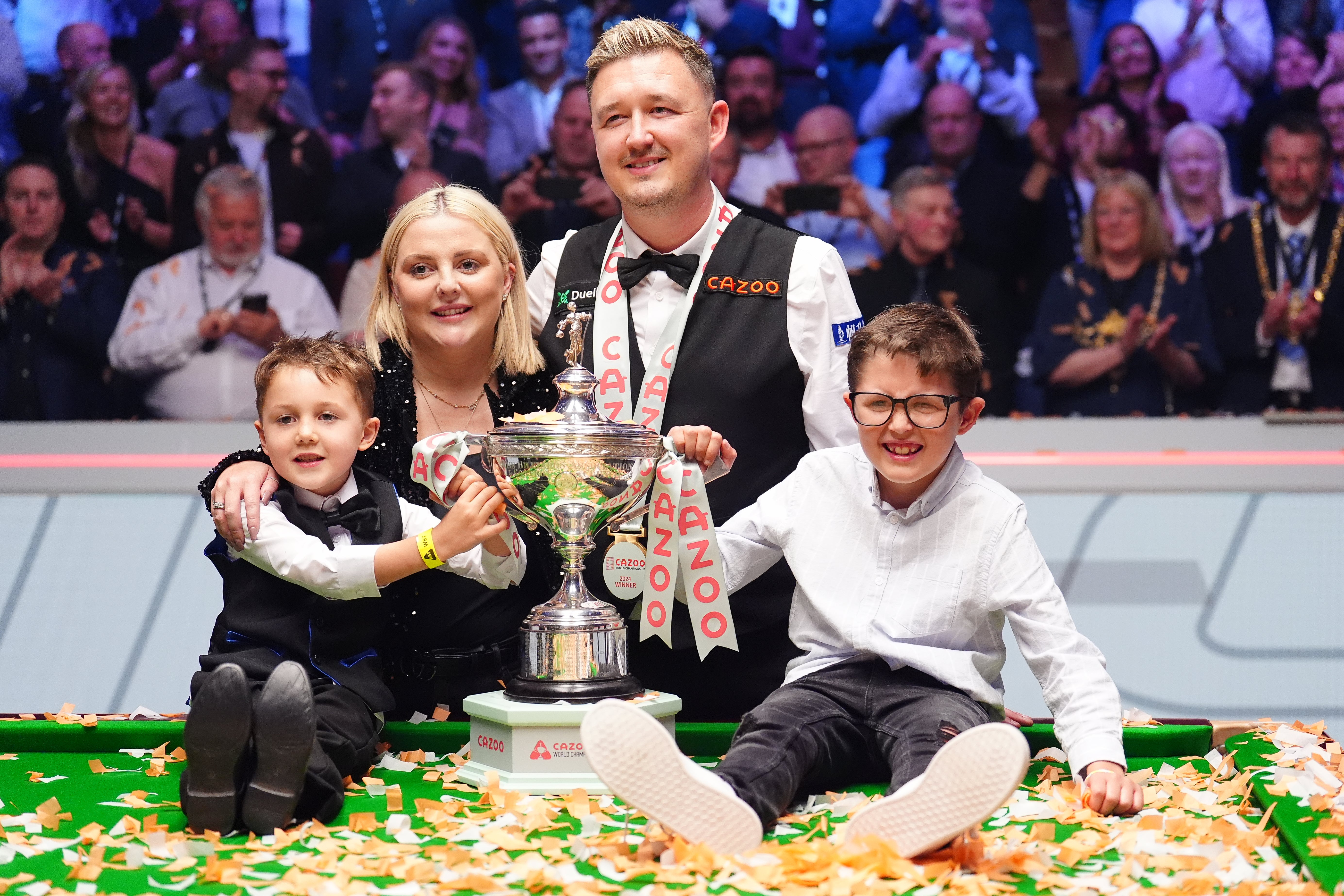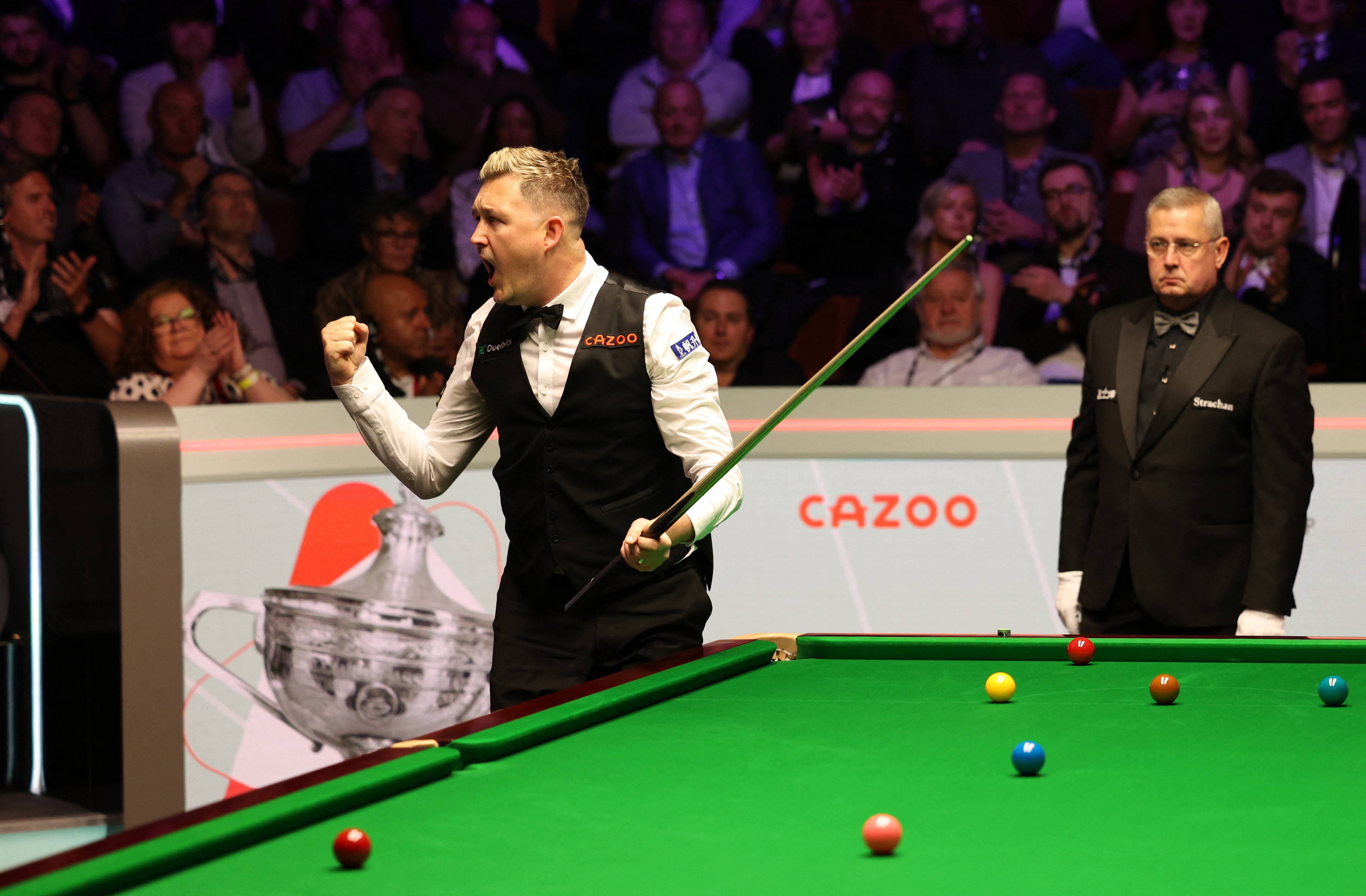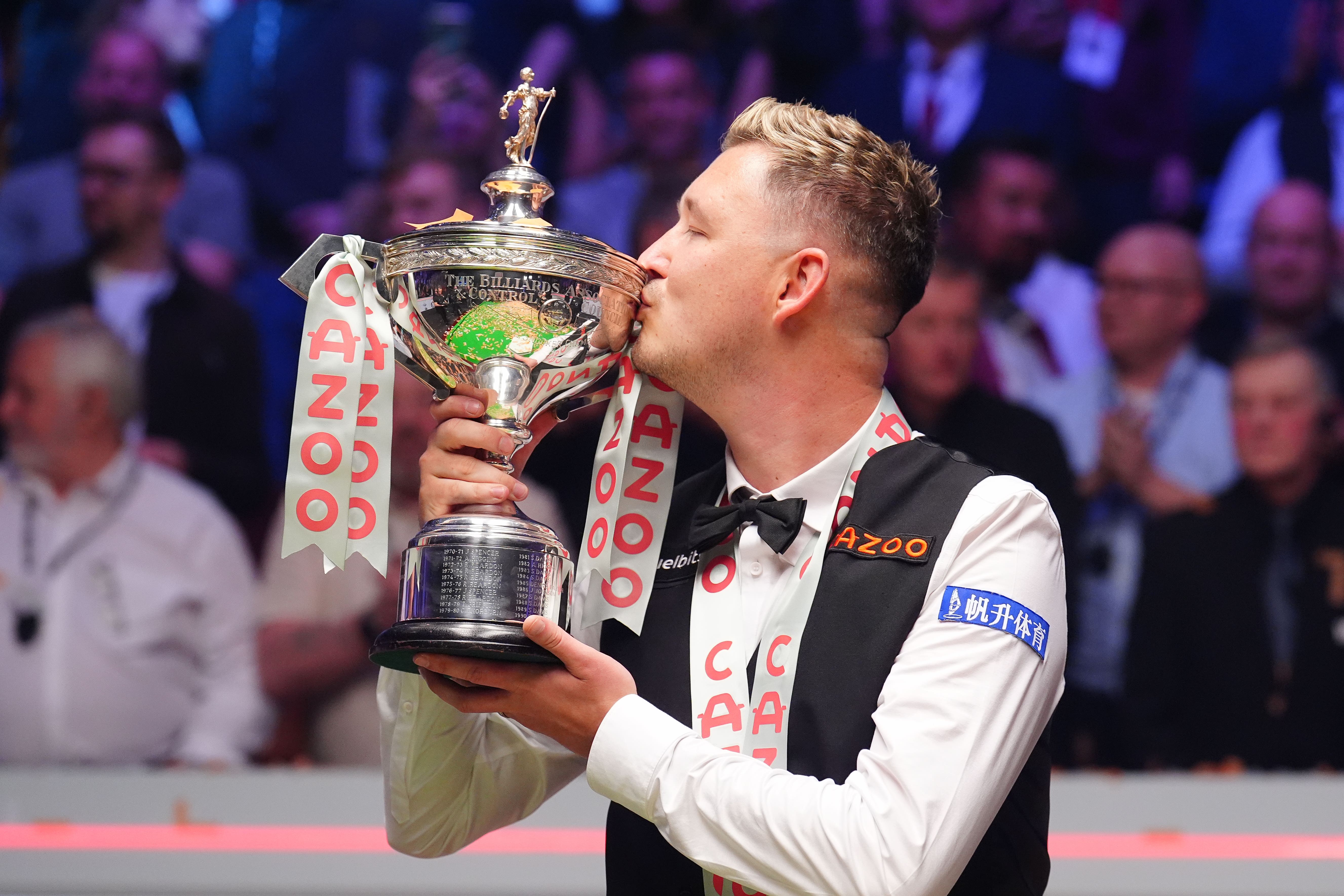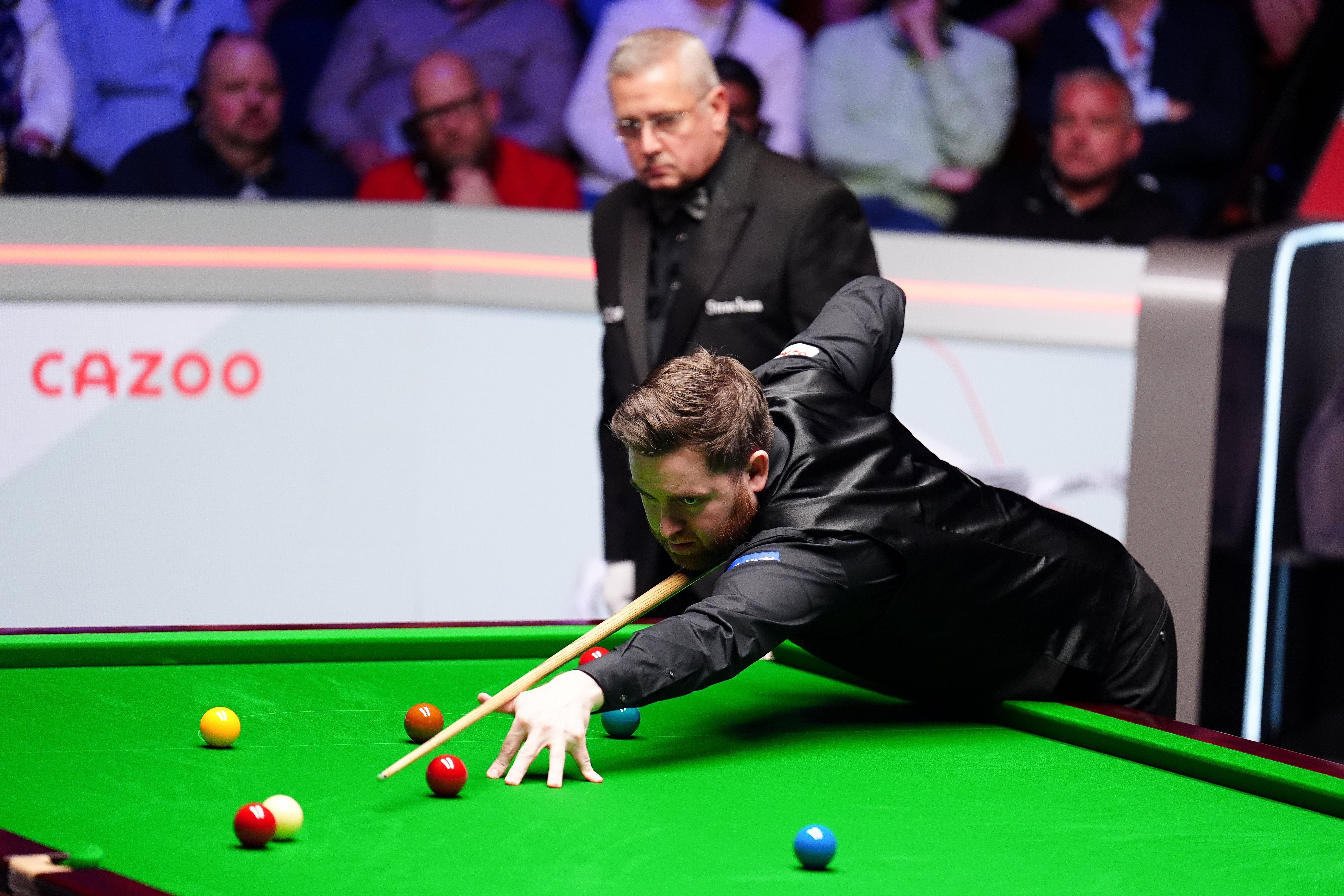Kyren Wilson’s hard-earned World Championship glory is a win for snooker’s lost generation
The 32-year-old won his first snooker world title after resisting the spirited comeback of Welshman Jak Jones at the Crucible Theatre

Your support helps us to tell the story
From reproductive rights to climate change to Big Tech, The Independent is on the ground when the story is developing. Whether it's investigating the financials of Elon Musk's pro-Trump PAC or producing our latest documentary, 'The A Word', which shines a light on the American women fighting for reproductive rights, we know how important it is to parse out the facts from the messaging.
At such a critical moment in US history, we need reporters on the ground. Your donation allows us to keep sending journalists to speak to both sides of the story.
The Independent is trusted by Americans across the entire political spectrum. And unlike many other quality news outlets, we choose not to lock Americans out of our reporting and analysis with paywalls. We believe quality journalism should be available to everyone, paid for by those who can afford it.
Your support makes all the difference.The last few balls clapped into the pockets with a thud. For Kyren Wilson, perhaps this was the best moment of all: the match was over, his opponent destined never to return to the table, and before the trophy arrived and the tickertape fell, before the microphones and the questions and the signatures and the lifetime commitment to taking selfies with strangers, he was alone with his cue in a warm fuzzy stasis, delaying the gratification just a little longer.
Wilson’s long backswing flowed back and forth like a pendulum, gliding over his bridge hand and through the white ball. After 30 years of playing snooker, after hundreds of thousands of balls potted and missed, after days upon days of sitting on cushioned chairs thinking and thinking, he had finally achieved everything he wanted. He turned to his family and screamed with relief. Kyren Wilson, world champion.
He had reached the final with utter conviction. The closest any opponent had got to Wilson up to that point was John Higgins in the quarter-finals, losing by five frames. David Gilbert lost by six. Joe O’Connor lost by seven. Dominic Dale lost by nine. But the final itself was tense and nervy and often dramatic, as he held off Jak Jones’s rousing late comeback to win 18-14.
Day two was a close contest which Jones edged, but really the match was won on Sunday afternoon when Wilson rushed into a 7-0 lead. Jones was helpless and lost, like a man enveloped in a thick fog. When he emerged for the evening he could finally see clearly, but from there he was always chasing, running just to standstill.

There were myriad turning points in the match, but two felt particularly significant. The first was the final frame on Sunday night, when Wilson found the snooker he needed and potted all the colours after an almighty tug of war over the black. Jones looked ashen faced as they shook hands. It should have been 10-7 overnight; instead it was 11-6.
Then there was the scrappy frame at the end of an even Monday afternoon. By now both players were exhausted, like broken fighters in the 12th round leaning on one another just to stay upright. Jones missed big chances and Wilson stumbled over the line, taking a 15-10 lead into the evening when 14-11 might have set off some nerves over dinner.
When they returned, Wilson won the first frame of the evening before Jones replied with a beautifully controlled century. Wilson won the next dramatically after fluking a re-spotted black to lead 17-11, one away from victory.
Then came a stunning Jones assault, freed by his new role of dead man walking. He rattled off the next three frames playing some fantastic snooker in parts, including an absorbing 147 attempt that collapsed with three reds remaining. The score became 17-14 and Wilson was clearly rattled.
But finally he took a chance, and after a hug from Jones, he let the tears flow.

“Mum and dad, they remortgaged, sacrificed their whole lives to get me here,” Wilson said. It was a family achievement and Wilson’s brother, too, was thanked after travelling with him on tour in the role of coach, PR guy, friend and right-hand man.
“[Jones] was so tough,” Wilson added. “I don’t think there are any people left in Wales, the amount they were cheering him on. It made it a fantastic atmosphere, every credit to those guys. Me and Jak have come through the junior ranks. This is Jak’s first final, let alone a world final, so he’s conducted himself in an amazing fashion and I’m sure he’ll be back.”
This will not go down as a classic tournament. The tight pockets meant far fewer century breaks and far more missed balls. It lacked some star power when a record number of top-16 players fell in the opening round and the favourites – Ronnie O’Sullivan and Judd Trump – never reached the single table setup, where they were meant to serve up an epic semi-final.
Yet its conclusion still feels neat and fulfilling, like a glove that fits. The bricks of Wilson’s career had been carefully laid, one on top of the other over a decade of dedication. First reaching the Crucible in 2014; then getting to a semi-final in 2018 where he lost to the matchplay nous of John Higgins; then reaching his first final in 2020, in an empty Crucible during Covid, where O’Sullivan ripped him limb from limb in a merciless 18-8 win.
Perhaps the fact he was barely mentioned ahead of this tournament was no bad thing. He may have had a slow season by his standards, but Wilson had all the pieces in place, the experience of going deep, the harsh lessons dished out by the Class of ‘92. He cruised under the radar, out of the limelight, rarely troubled or disturbed en route to the final.
Snooker needs O’Sullivan, of course, but it also needs new champions and fresh faces. You only need to look at how Luke Littler has transformed darts to understand what a hyper-talented teenager could do for this game too. At 32, Wilson is certainly not the same, but he does mark the belated arrival of a new generation. Until 12 months ago there had never been a snooker world champion born in the 1990s. Now there are two after Wilson followed last year’s winner, Luca Brecel.

Jones is from the same generation and his time may come again. He is 30 and there is still time to improve, to build on this experience. “If I could relax a little more in other tournaments then I think I could do a lot better,” he said this week. Perhaps that is something he can take forwards from his marathon journey, which began with qualifying in mid-April and totalled 55 hours of snooker.
And yet, Jones’s CV thus far does not suggest we are looking at a future king of the sport. This was his first final in any ranking tournament in 10 years of trying. With each missed opportunity at the table, with each frame-winning chance that got away, it felt like the chance of a lifetime was slipping through his fingers.
“Congratulations to Kyren and his family, they deserve it,” said Jones, who had smiled throughout the final and continued through his speech. “If anyone deserves it, he does, so congratulations to them.
“It’s been an unbelievable tournament for me. About a month ago I was in my first qualifying match. It’s been a long month but I’m happy with it. I wouldn’t say [I came in] with a lot of hope. I just thought if I try my best, basically, see what happens. But when you’re playing someone as solid as Kyren, with such a good all-round game, it’s going to be hard to come back from a deficit like that. It wasn’t to be.”
Join our commenting forum
Join thought-provoking conversations, follow other Independent readers and see their replies
Comments